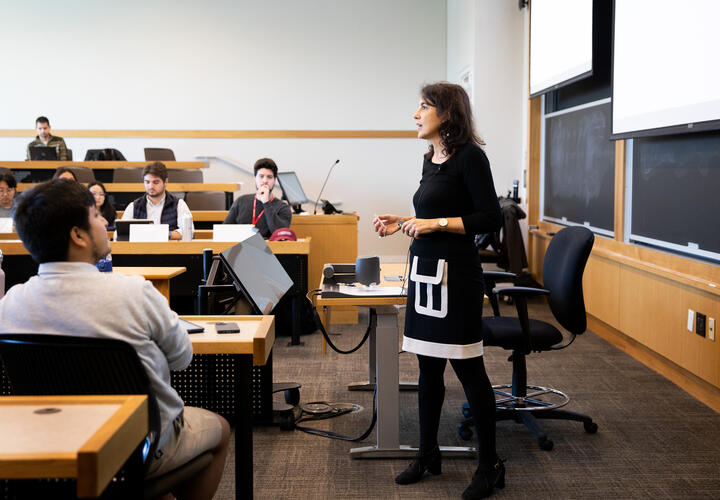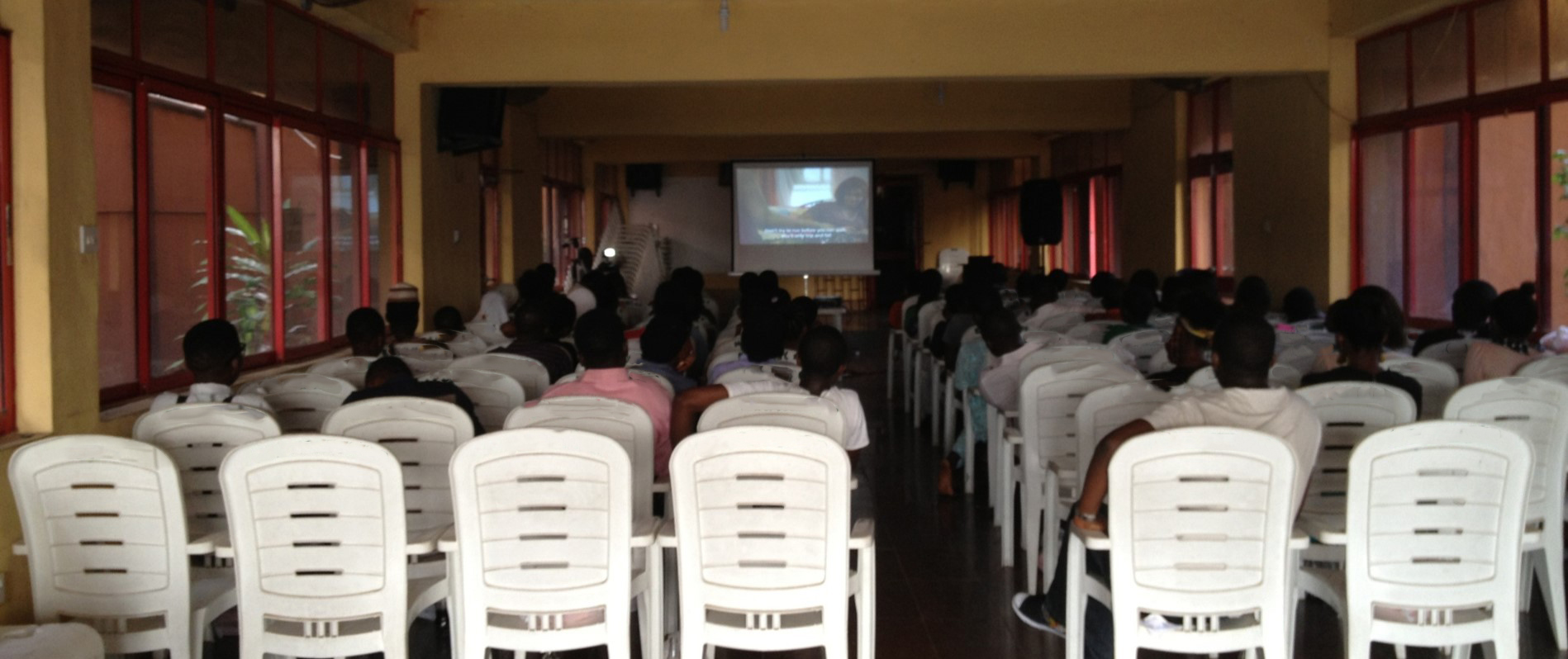Yale Welcomes Eliana La Ferrara for a Lecture on the Power of Social Factors in the Development Process
The Harvard professor will deliver the 32nd Kuznets Memorial Lecture, “Changing Harmful Norms" hosted at Yale by the Economic Growth Center and simulcast online March 2.

Economics has gone through a major shift in recent decades, from modeling people’s behavior based on a limited set of variables, to acknowledging and integrating a wider range of determinants, including social structures. How do values, beliefs, and biases affect individual outcomes? For example, how do gender-based norms keep women and girls from reaching their full potential?
In events on March 2 and 3, economists from Yale and beyond will present new research on how norms and other social restrictions affect both individuals and economic development in lower-income countries. The keynote event will be a lecture by Eliana La Ferrara, Professor of Public Policy at Harvard Kennedy School, who is also the First Vice President of the Econometric Society, which is headquartered at Yale’s Cowles Foundation for Economic Research. Her research crosses boundaries from economics into several other disciplines to uncover the causes and effects of bias.
"The Economic Growth Center has been hosting the Kuznets Lecture Series annually since 1987, focusing largely on the measurement of economic growth" explained Rohini Pande, Henry J. Heinz II Professor of Economics and director of the center. "This year, Eliana's lecture marks an acknowledgment that we can't understand growth without recognizing the role of informal institutions – family groups, immigrant communities, traditional gender roles, and others."
EGC recently spoke with La Ferrara about her career, her recent research, and how economics can be harnessed to promote positive norms while curbing harmful ones. Her answers have been edited for length.
Your research topics have been incredibly diverse over the course of your career, ranging from ethnicity to education and from developing to advanced economies. What attracts you to a particular project?
As a PhD student, I was interested in fairly mainstream ideas about market imperfections, such as the economic effects of lacking credit access. But while working on this in Africa, I also became interested in the literature on ethnic identity and kin group membership – so I decided to investigate whether those social factors could alleviate credit market imperfections. Working in Ghana, I found that kin groups often served as an important source of information, enforcement, and reciprocity, thus allowing people who lacked access to formal credit to obtain informal loans from kin members.
Later, I studied choices made within the family, in particular around fertility, and it occurred to me that the messages conveyed by society through the media could also affect those choices. I started a project focused on soap operas in Brazil, where these shows play an important cultural role. After noticing that Brazilian soap operas often depicted small families, my empirical research found that the shows actually lowered the fertility rate across Brazil.
Based on that insight, I made efforts over the years to actively use entertainment education, or “edutainment,” to advance particular development priorities. I’ve collaborated with TV producers to create programs aimed at conveying important information to the public, from health to agriculture, and collected data to understand how viewers responded to the messages.
What has been your most powerful experience of using edutainment to advance traditional development goals – and how do you find the right balance between educating and entertaining?
In Nigeria, I worked with MTV and the World Bank to evaluate the effectiveness of a series called Shuga, a TV show that seeks to change attitudes and behavior relating to HIV and risky sexual behavior. We designed a randomized controlled trial where we varied exposure to the show and to social messages across different audiences, and we found that the show was effective at increasing HIV-related knowledge, reducing risky sexual behavior, and increasing HIV testing.
It is fascinating to see how the production teams can blend in educational messages while still making the stories entertaining. You can’t have a lecture in the middle of a soap opera, but you also can’t be so subtle that people miss the message, and you can’t oversimplify it so much that it gets misinterpreted. In theory, though, blending the message into entertainment media can increase people’s likelihood of internalizing it by reducing what social psychologists call “counter-arguing.” Even on sensitive topics that people would otherwise have barriers about discussing, media can convey key messages precisely because it is not perceived as a top-down directive.
 Photo courtesy of Eliana La Ferrara
Photo courtesy of Eliana La Ferrara
A screening of Shuga, a series produced by MTV International, and evaluated by La Ferrara and coauthors.
How do these approaches differ methodologically from traditional economic research, and are they used to tackle negative social norms as well as promoting positive ones?
Often, it’s just a matter of adding a social or behavioral component to a mainstream intervention. For instance, a group of researchers and I recently studied academic gaps between immigrant and native students in Italian middle schools. The data showed that high-achieving immigrant students often self-sorted into less demanding academic tracks, and we hypothesized that this might be due to certain constraints they face in school, including potential bias from teachers. Our intervention paired immigrant students with counselors who helped them understand how talented they were and what steps they needed to take to succeed on more demanding tracks. However, instead of just focusing on academic outcomes, we introduced these behavioral components – discussing the students’ perceptions of self, encouraging them to invest in themselves, and showing them how to set goals and achieve them. Our findings showed that the immigrant students’ aspirations increased, setting them on a more upwardly mobile path.
There is a less optimistic side to this type of research – often, social norms can be bad. Recently, I’ve been focusing on restrictive gender norms that seem to trap people into certain choices – such as the practice of female genital cutting. Using economic tools, we are trying to understand how these norms evolved, why the harmful practices persist, and whether there are policies or social interventions that can be effective at reducing them. This will be a major focus of my lecture at Yale. Social factors didn’t always play an important role in economics.
What drew you to these topics, and how has the sub-field evolved over the course of your career?
Actually, I was drawn to social issues first – then economics. As a student in Italy, I had always been interested in social issues and I very much wanted to do something useful to have an impact on society. But I also enjoyed mathematics and quantitative work. I initially pursued economics as a way to work on social issues like poverty in low- and middle-income countries. When it came time to decide what I would focus on as a researcher, it was pretty natural: I’d work on economic development, but I’d focus on questions about social structure and how the structures individuals are embedded within affect their opportunities and choices.
What do you see as the broader significance of your research and its contribution to the study and practice of development?
My work over the years has convinced me of the importance for economists to gain insights from disciplines like anthropology, sociology, psychology, and political science. The profession has made a lot of progress towards incorporating contributions from these other disciplines, but more is needed. In particular, so many of the questions and policies I work on require deep knowledge of the local context being studied – and that’s an area where economists often don’t invest as much as we could. I am certainly not alone in caring about this; I’m one of many economists nowadays who are working on these issues. But I hope at least part of my contribution has been to further push our field in that direction.
Eliana La Ferrara’s lecture “Changing Harmful Norms” will take place Thursday, March 2 at Luce Hall (34 Hillhouse Avenue) with a live simulcast. Registration is required to attend online. The Kuznets Memorial Lecture honors Simon Kuznets (1901-1985), the Nobel Prize-winning economist who was instrumental in the founding of the Economic Growth Center.